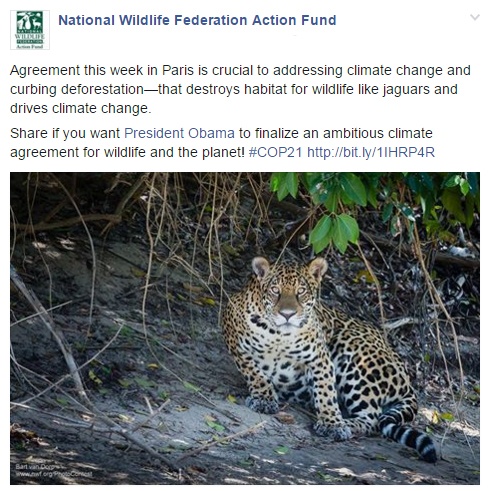We have much more to do and your continued support is needed now more than ever.
Join the Call for an Ambitious Global Climate Agreement in Paris
The international climate negotiations in Paris are rapidly approaching a critical juncture, when leaders from nearly 200 countries will decide whether we leave with the first comprehensive global agreement to reduce carbon pollution. The National Wildlife Federation is in Paris working to ensure that the agreement finalized at the end of this week will limit global warming to 1.5oC and chart a course for people and wildlife that avoids the worst impacts of climate change.
Help NWF seize this opportunity to call for an ambitious and fair climate agreement that will limit dangerous climate pollution and ensure protections for people and wildlife.
Share on Facebook or tweet this message to President Obama urging him to finalize an ambitious climate agreement!

But time is short and many hard decisions need to be made before COP21 comes to a close this week and high-level diplomats return to their home countries.
The final agreement needs to bring governments back to the table before 2020 to improve the current carbon pollution reduction pledges they’ve each made over the course of the year. Many experts calculate that these pledges, currently called “INDCs” (Intended Nationally Determined Contributions) are a good start, but still too weak to avoid serious impacts from climate change.
These INDCs (or whatever name they come to be called in the ultimate agreement) should be reviewed frequently and strengthened as needed to ensure they set us on the 1.5oC path. Developed countries also need to assure that developing countries are receiving the necessary finance and technical assistance they need to adapt to the unavoidable impacts of climate change.

Governments must also be transparent about how they account for emissions reductions in the sector. This requires a clear set of rules, based on the best-available science. The National Wildlife Federation staff in Paris are actively fighting to ensure sound accounting principles – for all sectors – are solidly enshrined in the final Agreement.
Bolstered by speeches from President Obama, Secretary of State Kerry, and other global leaders, our staff is increasingly optimistic as we watch the general consensus form that the Paris Agreement, for the first time in history, will apply to all countries and that all will participate. The tone of the talks in Paris right now is showing an unprecedented level of support and willingness to reach a strong, comprehensive, and ambitious climate deal that sets us on the path we need for the benefit of wildlife and our children’s future.
Help NWF seize this opportunity to call for an ambitious and fair climate agreement that will limit dangerous climate pollution and ensure protections for people and wildlife.
Share a post on Facebook or retweet on Twitter urging President Obama to finalize an ambitious climate agreement!






















